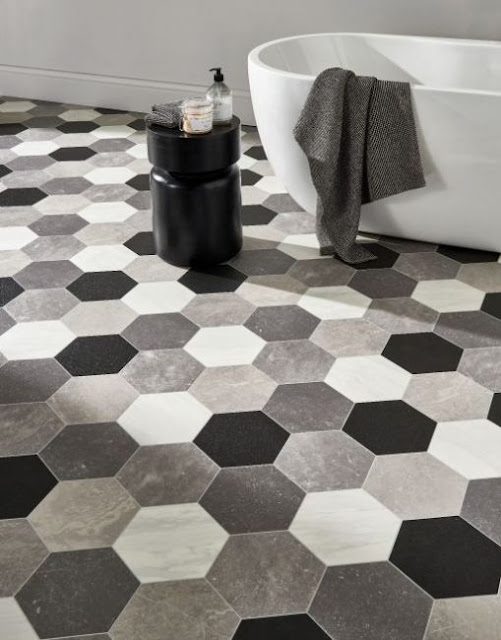The bathroom is a water-heavy space with constant steam and water. This means that choosing a bathroom floor that not only feels and looks nice, but also functions well in the worst conditions, is essential. Important considerations when selecting flooring for your bathroom are its ability to withstand wetness and humidity, its ease of cleaning, and its non-slip properties when damp. In addition to being safe and comfortable to walk on, your bathroom floor should offer a variety of design options to suit your tastes.
1)Vinyl
in The Bathroom
One excellent option for waterproof bathroom flooring is vinyl. There are several vinyl goods available, such as heavy-duty vinyl flooring roll(also called sheet vinyl) and luxury vinyl tile (LVT), which are both great options for bathroom flooring. They are warm underfoot, long-lasting, resistant to dampness, and simple to clean and maintain. They are safe for use in slick restrooms because they are also offered with a grip that resists slippage.
2)Natural
Stone
Natural
stone can be a great option for a classy and classic style, like marble or
travertine. Natural stone flooring gives the bathroom a sense of refinement and
beauty. Even though it is strong and water-resistant, it could need more upkeep
than other choices.
Regular
stone sealing helps shield the stone from stains and water damage. If you
reside in a colder climate, keep in mind that natural stone might be colder
than other materials. You may want to think about installing underfloor
heating. Although the installation process and initial cost may be more
complicated, the investment may pay off in the long run and terms of
appearance.
3)
Engineered Wood
Engineered
wood offers a good substitute for genuine hardwood, which is usually not
advised for bathrooms because of its moisture sensitivity. Because it is made
of moisture-resistant layers, engineered wood is more stable in humid
environments.
Without the
chance of swelling or warping, engineered wood flooring provides the warmth and
beauty of hardwood. Selecting a product made especially for bathrooms and
according to installation instructions is crucial. Maintaining the integrity of
engineered wood requires timely cleanup after water spills and routine
maintenance.
4)
Laminate Flooring
Another
affordable choice that has grown in favor recently is laminate flooring. Its
high-density fiberboard core is covered in a photographic layer that simulates
the appearance of stone, tile, or wood. Although laminate is not completely
waterproof, many contemporary laminates include water-resistant qualities that
make them appropriate for use in bathrooms.
5)Cork
flooring
Bathroom
flooring made of cork is both comfy and environmentally friendly. It is
resistant to mold and mildew because of its inherent antibacterial qualities.
Additionally, cork offers a more comfortable surface underfoot than many other
flooring materials.
Cork
flooring is not completely waterproof, despite its advantages. To keep it water
resistant, sealing must be done frequently, and standing water should be
avoided. Furthermore, cork flooring may get scratches or dents from heavy
furniture or sharp objects.
6)Porcelain
Tile
Porcelain
tiles are a strong and water-resistant alternative for bathroom flooring, much
like ceramic tiles. Porcelain is unique because of its density, which increases
its resistance to wear and water. There are many different sizes and kinds of
porcelain tiles, including ones that resemble real stone.
Although
porcelain tiles are a great option for bathrooms, their cost may exceed that of
alternative materials. The cost will likely increase if expert assistance is
needed throughout the installation process. Porcelain tiles, however, might be
a wise investment because of their durability and low care requirements.





.png)




0 Comments